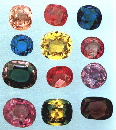

Color
: Blue in various hues, colorless, pink, orange, yellow,
green, purple, black
Color of streak: White
Mohs� hardness : 9
Specific gravity : 3.99-4.00
Cleavage : None
Fracture: Small
conchoidal, uneven, splintery
Crystal system : Trigonal
Chemical composition : Aluminium oxide
Refractive index : 1.766-1.774
Double refraction : -0.008
Fluorescence : Blues
; (purple) none Yellows from Sri Lanka : weak ; orange ; colorless : orange-yellow
or purple
The name sapphire (Greek � blue) used to be applied to various stones. In antiquity
and as late as the Middle Ages, the name sapphire was understood to mean what
is today described as lapis lazuli. Around 1800 it was recognized that sapphire
and ruby are gem varieties of corundum. At first only the blue variety was called
sapphire, the corundums of other colors (with the exception of red) were given
special, misleading names, such as �Oriental peridot� for the green variety
or �Oriental topaz� for the yellow type. Today corundums of all colors except
red are called sapphires. Red varieties are called rubies. The various colors
of sapphire are qualified by description, ie. Yellow sapphire, green sapphire.
Sapphire without additional qualification refers to blue corundum. Orange pink
sapphire is called Padparadchah (Sinhalese for �Lotus Flower�).